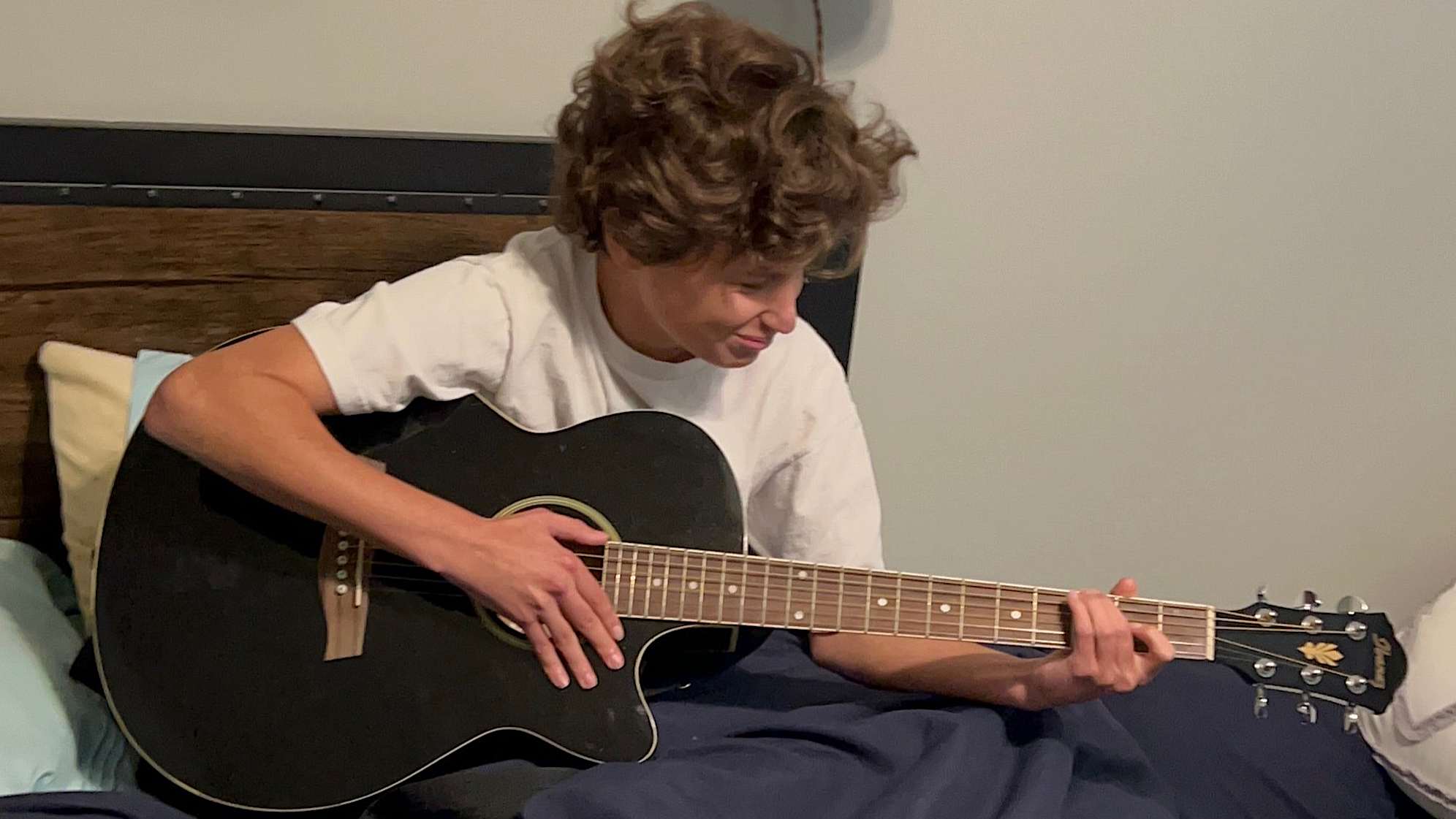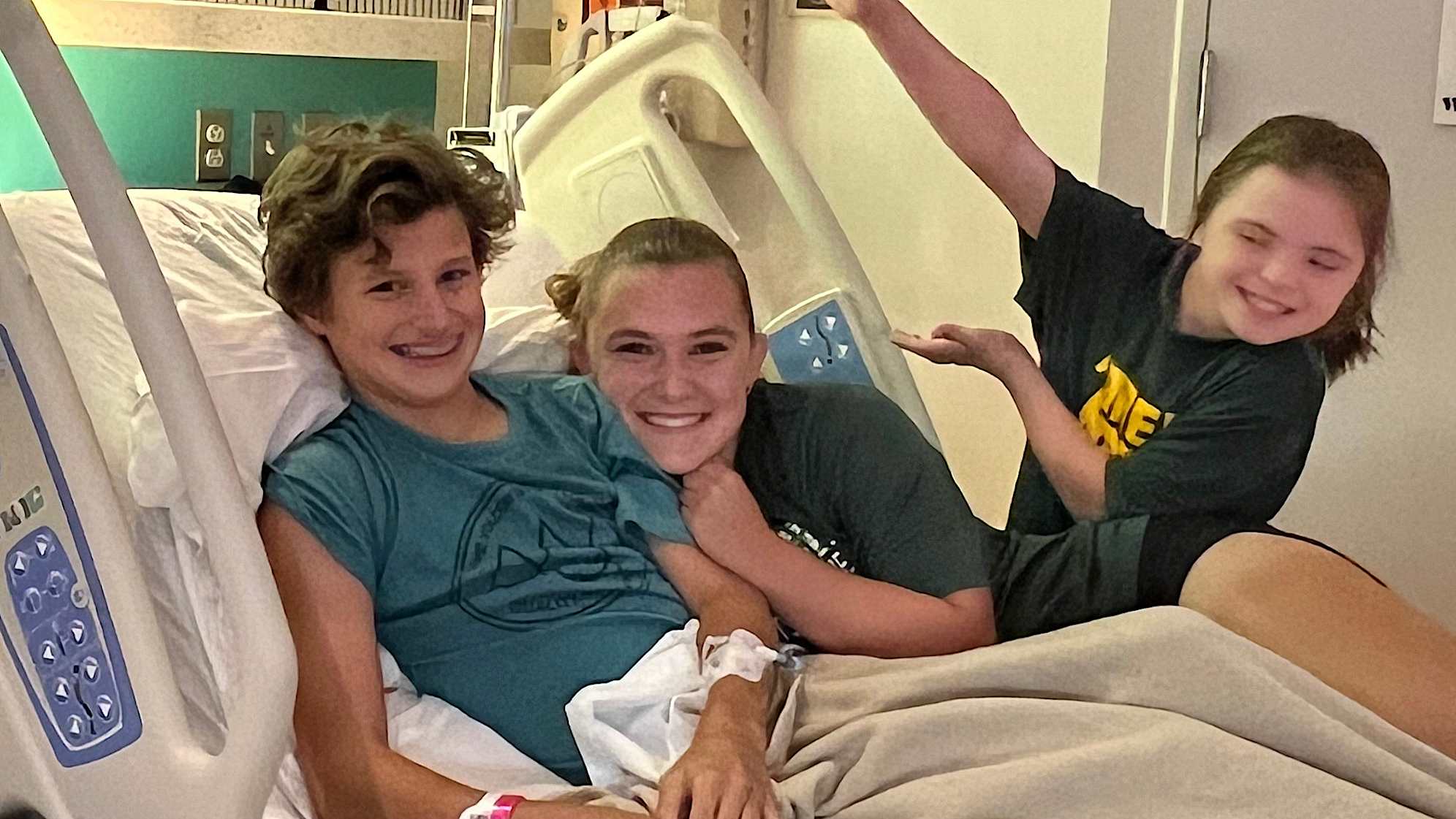Teen golfer given new life through kidney transplant at Texas Children’s Hospital
7 Min Read

Andrew Ross is the first pediatric patient at Texas Children's Hospital with active cancer to be considered for and undergo a kidney transplant. (Courtesy Ross family)
Written by Helen Ross
Three days a week, Andrew Ross was hooked up to a dialysis machine by two large needles inserted into his upper arm. One carried his blood to an artificial kidney that removed any excess fluid, waste and other toxins. The other returned the cleansed blood to his body.
Each dialysis treatment took roughly five hours, doing in 15 hours each week what a healthy kidney does 24/7. The sessions on Tuesdays, Thursdays and Saturdays started at 7 a.m. and generally left Andrew physically drained and often sick to his stomach. The 16-year-old still managed to attend school on Monday, Wednesday and Friday and keep up with his homework, though.

Andrew Ross (left) with his older sister Abby (right). (Courtesy Ross family)
And when he wasn’t tethered to that life-saving machine or pouring over textbooks, Andrew could often be found on the golf course.
“I'm a golf enthusiast, but this guy – even through dialysis – would still make time for playing golf,” says Dr. Poyyapakkam R. Srivaths, the pediatric transplant nephrologist at Texas Children’s Hospital who supervised his care.
“That was just incredible, really," Dr. Srivaths adds. "Right after finishing a session or during a weekend, they would actually go to some tournaments. … Our dialysis team was amazed at how spirited this guy was, … how he kept his hopes alive through this incredible dialysis journey.”
Andrew, who plays on his high school golf team, is one of many young people who have been given new life – quite literally – by the doctors and nurses at Texas Children’s Hospital. The facility, which is the largest pediatric hospital in the United States, is the primary beneficiary of this week’s Texas Children’s Houston Open.
Andrew’s journey began when he was just 8 years old. The persistent, debilitating pain in his stomach was diagnosed as stemming from a stage IV pancreatic neuroendocrine tumor. The cancer is rare, particularly in pediatric patients. For the first two years, Andrew took 11 different pain medications around the clock.
“It’s just hard watching your 8-, 9-year-old kid going through that, and there's nothing really you can do,” Andrew’s father David says.
Doctors eventually found three tumors in Andrew’s pancreas and more than 50 in his lymph nodes and liver. When chemotherapy didn’t work, doctors opted for two rounds of targeted radiation therapy, which was "one of the big contributing factors in my cancer getting held at bay,” Andrew says.
At the same time, though, the immunosuppressants that Andrew took to help the radiation work began to damage his kidneys. That’s when Dr. Srivaths and his team stepped in to supervise the dialysis and eventually discuss the possibility of a transplant.
First, though, the two tumors that remained had to become stable which meant about 18 months of dialysis. Andrew is the thought to be the first pediatric patient at Texas Children's Hospital (TCH) who had active cancer to be considered for a kidney transplant. And once the tumor board approved the procedure, a donor had to be found.
Turns out, his father David was a perfect match.
“It was like a no-brainer for me just because of all the cancer stuff he's gone through that was hard and not fun to deal with, and always medicines and tons of pain and things like that involved,” David says.
“But dialysis was definitely the biggest impact on his life. … He would be so just worn out after dialysis was done. So it would really take Tuesday, Thursday, Saturday, every week where almost it would be until 6 at night when he would finally perk up and have to start on homework and things like that right away.
“It was just for a year and a half of a constant repeat of that. So, it was just hard for him to have a normalcy in life. So, as a dad, I just was happy for there to be any way possible to have him get some form of relief from that.”
The relief came in July of 2023. Andrew checked into TCH, which has led the nation in pediatric transplants for the last seven years, after his last dialysis session, his parents by his bedside. David, who runs marathons – and even longer distances – eventually went home to get some rest while his wife spent the night with their son.
“We were reminding him of all the things you've been through, this will be an easy one,” David says. “I think he started to become comfortable with, he was asking me if I was nervous. For me, I felt like I've had, I don't know, four major surgeries for my ACL. I keep tearing it. So I felt like those are probably more painful than this is going to be. So I wasn't too worried at all.
“I just was happy that he was going to have a break from everything.”
David’s surgery was performed at Houston Methodist Hospital West, which is next door to TCH. Doctors removed his left kidney and took it across the skybridge to transplant into Andrew. After a night in the hospital, David walked across the street to see his son.

David Ross (left) after his kidney removal surgery. (Courtesy Ross family)
Andrew spent the next 10 days in the hospital. His recovery, though, has been remarkable. He now plays soccer like his older sister Abby, as well as golf, which he first learned to enjoy as an ambassador for an organization called Triumph Over Kid Cancer. TOKC also happens to be close to the heart of Andrew’s favorite golfer, world No. 1 Scottie Scheffler who was a friend of the organization’s late founder.
“I enjoy being outside but not having to be so exhausted and tired and running,” Andrew says when asked why he likes golf. “But it's just when it's nice day and it's pretty scenery and when you hit a good shot, that feeling of completion or not completion, but happiness. I love when I hit a good shot.”
David says it’s hard to quantify how important Texas Children’s Hospital has been to his family. His youngest daughter Grace, who is now 12, has Down syndrome and has undergone six open heart surgeries, the first when she was just a week old.

Andrew Ross (left) pictured with his family. (Courtesy Ross family)
“I think we've probably stayed on just about every single level in the hospital at this point for some form of treatment or another,” he said.
David says the family’s strong faith helped them navigate the dark days.
“So, Grace, our youngest, we've almost lost her twice and now she's great, but her first 15 months of life were pretty rough for her,” he says. “And then the same thing with Andrew. I mean, when you get all sorts of reports like, 'Oh, his cancer's doing well; oh, it's not good,' it comes back in.
“But Andrew, he asked some really hard questions through those times like, 'I know God loves me. I know that God is all-powerful. I know that God cares about me and he can do anything, so why isn't he taking this away from me?' And it just provided good opportunities to have good discussions.
“So I'd say for all three of our kids, I think that through the stuff that we've gone through, their faith has really been tested. And I'd say that's probably our biggest thing is we have a tremendously strong Christian faith that helps us to be able to encounter these things.”
Dr. Srivaths also marvels at the family’s strength – particularly that of Andrew. To stay current with his studies and chase his dreams while on dialysis and waiting for a transplant was nothing short of amazing, according to his doctor.
And maybe one day, the two will even get to tee it up together.
“So that is one thing we talk about,” Dr. Srivaths says with a chuckle. “I am sure he is going to beat me hands down. But someday I am going to be brave myself.”'














